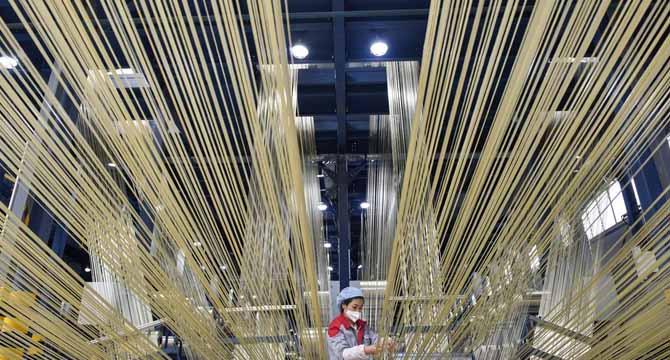BEIJING, April 26 (Xinhua) — China will continue to enjoy rich human resources and pick up its pace to improve the quality of the labor force to drive the country’s high-quality economic development, according to analysts.
A large population remains China’s basic national condition and the demographic dividend will continue to underpin the economic growth for a long time to come, said Wang Qinchi, a researcher at the China Population and Development Research Center.
The rich supply of human resources has provided an abundant labor force and rapid accumulation of capital for the nation’s economic development, helping the country to become an ultra-large consumer market and an economic heavyweight in the global arena.
China now has a nearly 900 million working-age population, exceeding the total amount of working-age population of all developed countries in the world. The country also boasts the world’s largest talent pool with the most complete categories.
Despite a declining fertility rate and a deepening aging population in recent years, experts have dismissed concerns over the diminishing demographic dividend in the country.
A population of 1.4 billion means a tremendous market, which remains a prominent strength of China, said Wang.
Chinese authority has stressed that when assessing demographic dividends, it is quality rather than quantity that is more important.
More than 240 million people have received higher education in China. The gross enrollment rate of China’s higher education hit 57.8 percent in 2021, according to the Ministry of Education.
Efforts to nurture talent for technological innovation have helped China sit atop the world in terms of the number of valid invention patents and the number of scientific articles that are included in the Scientific Citation Index.
The profound changes in labor force resulted from China’s continuous efforts to raise the education level of its population.
China views education, science and technology, and human resources as important foundational and strategic pillars for building a modern socialist country in all respects.
Up to 2022, China’s fiscal spending on education remained above 4 percent of its GDP for 10 consecutive years, laying a solid foundation for a higher-quality labor force.
A professional in sci-tech innovation can make a much greater contribution to social and economic development, said Sun Rui, a researcher at the Chinese Academy of Personnel Science, adding that talent has become a key factor in the competition for national strength.
Nurturing outstanding creative talent will help upgrade demographic dividend into talent dividend, providing long-lasting impetus for high-quality development, Sun said.

